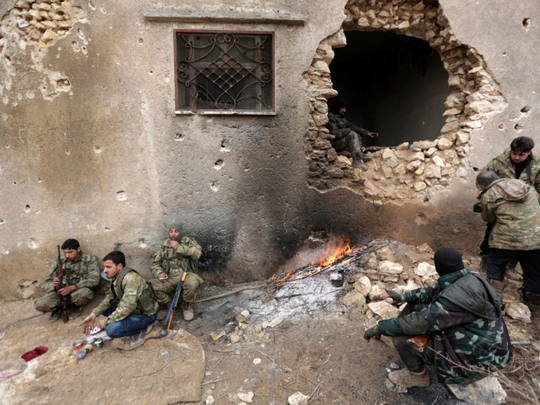
Amman: Syrian rebel negotiator Mohammad Alloush said on Monday he would head the rebel delegation to the peace talks backed by Russia and Turkey in Kazakhastan, saying this was to “neutralise the criminal role “ of Iran in the Syrian conflict.
Syrian rebel groups said Monday they will attend peace talks next week, in a boost to efforts by rivals Turkey and Russia to put an end to the nearly six-year-old conflict.
The talks, beginning on January 23 in the Kazakh capital Astana, are set to build on a nationwide truce that has largely held despite escalating violence across several battlefronts in recent days.
Alloush, a former senior negotiator with the Saudi-backed Higher Negotiations Committee during past rounds of UN- sponsored peace talks in Geneva, said their participation was needed to hold back Iran’s militias fighting in Syria.
Organised by rebel backer Turkey and regime allies Russia and Iran, the meetings are the latest bid to put an end to the internecine war raging in Syria since March 2011.
The powers have backed opposing sides of Syria’s conflict for years but have worked unprecedentedly closely in recent weeks to end the bloodshed.
If the Astana meetings are successful, they could augur well for fresh UN-hosted negotiations on the conflict next month in Geneva.
“All the rebel groups are going (to Astana). Everyone has agreed,” said Alloush, a leading figure in the Jaish Al Islam (Army of Islam) rebel group.
“Astana is a process to end the bloodletting by the regime and its allies. We want to end this series of crimes,” Alloush said.
Ahmad Al Othman from the Sultan Murad faction also said that “the rebel groups have decided to go to the talks.”
Sources from the opposition and the regime said the talks would “probably” be face-to-face.
Several rounds of peace talks held by the United Nations have failed to produce a political solution to the conflict.
The Astana talks will assume a different approach, focusing strictly on military developments ahead of political discussions in Switzerland in February, opposition figures said.
Ahmad Ramadan, from the leading National Coalition opposition group, said the Astana talks would aim to reinforce the truce “while the details of the political process will be left to Geneva.”
“Despite all the truce violations, what pushed us to agree to attend was the fact that the agenda will be focused on the ceasefire only,” said Osama Abu Zaid, a legal adviser to rebel groups.
The opposition’s delegation to Astana “will be only military,” but would be consulting with “a team of legal and political advisers” from the High Negotiations Committee, he said.
The HNC is the main umbrella group for Syria’s opposition factions, negotiating on their behalf last year in Geneva.
Abu Zaid said the Fateh Al Sham Front, which changed its name from Al Nusra Front after breaking away from Al Qaida, would not attend Astana.
US President-elect Donald Trump’s transition team has been invited to take part, but has not yet officially responded.
Earlier this month, Syrian President Bashar Al Assad said he was “optimistic” about the talks and would be “ready for reconciliation with (rebels) on the condition that they lay down their arms,” according to French lawmakers with whom he met.
More than 310,000 people have been killed and millions have fled their homes since protests erupted against Al Assad’s rule in the spring of 2011.
Over the years, the conflict has also witnessed the rise to prominence of terror groups like Daesh and Fateh Al Sham.
Daesh terrorists on Monday pressed their brutal offensive against government troops around the key eastern city of Deir Al Zor, a military source said.
“Syrian army units in Deir Al Zor city faced a violent attack from Daesh fighters at dawn today,” the source said.
He said government forces were fighting back the terrorists near the Deir Al Zor military airport and several other neighbourhoods south of the city, carrying out more than 20 air strikes on Daesh positions on Monday.
“Daesh has resorted to heavy use of infiltrators and on huge reinforcements from Raqqa and western parts of Deir Al Zor province,” the source said.
Raqqa, to the north, is the de facto capital of the self-styled caliphate Daesh declared across Syria and Iraq more than two years ago.
Around 200,000 people live in Deir Al Zor city, which has been besieged by Daesh since early 2015 and is the capital of the oil-rich province of the same name.
Daesh already controls more than half the city and launched a fierce offensive on Saturday to capture the remaining government-held territory.
The Syrian Observatory for Human Rights said the assault had left at least 28 regime forces dead so far, as well as 40 Daesh fighters and at least 14 civilians.












